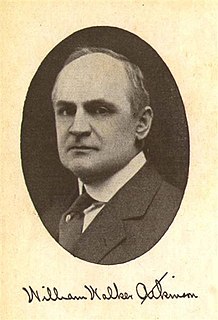A Quote by Henry Hazlitt
The whole gospel of Karl Marx can be summed up in a single sentence: Hate the man who is better off than you are. Never under any circumstances admit that his success may be due to his own efforts, to the productive contribution he has made to the whole community. Always attribute his success to the exploitation, the cheating, the more or less open robbery of others. Never under any circumstances admit that your own failure may be owing to your own weakness, or that the failure of anyone else may be due to his own defects - his laziness, incompetence, improvidence, or stupidity.
Quote Topics
Admit
Always
Any
Anyone
Anyone Else
Attribute
Better
Better Off
Cheating
Circumstances
Community
Contribution
Defects
Due
Efforts
Else
Exploitation
Failure
Gospel
Hate
He Man
His
Incompetence
Karl
Laziness
Less
Made
Man
Marx
May
More
More Or Less
Never
Off
Open
Others
Owing
Own
Productive
Robbery
Sentence
Single
Single Sentence
Stupidity
Success
Than
Up
Weakness
Whole
Your
Related Quotes
The wise man does nothing but what can be done openly and without falseness, nor does he do anything whereby he may involve himself in any wrong-doing, even where he may escape notice. For he is guilty in his own eyes before being so in the eyes of others; and the publicity of his crime does not bring him more shame than his own consciousness of it.
Idleness is often covered by turbulence and hurry. He that neglects his known duty and real employment naturally endeavours to crowd his mind with something that may bar out the remembrance of his own folly, and does any thing but what he ought to do with eager diligence, that he may keep himself in his own favour.
His face set in grim determination, Richard slogged ahead, his fingers reaching up to touch the tooth under his shirt. Loneliness, deeper than he had never known, sagged his shoulders. All his friends were lost to him. He knew now that his life was not his own. It belonged to his duty, to his task. He was the Seeker. Nothing more. Nothing less. Not his own man, but a pawn to be used by others. A tool, same as his sword, to help others, that they might have the life he had only glimpsed for a twinkling. He was no different from the dark things in the boundary. A bringer of death.
Your actions are your own. Your choices are your own. Each of us carries a burden of guilt for decisions made or not made. You can let that rule your whole life or you can put it behind you and move on. Only a madman lets jealousy determine the course of his existence. Only a weak man blames others for his own errors.
Clearly the hardest thing for the working artist is to create his own conception and follow it, unafraid of the strictures it imposes, however rigid these may be... I see it as the clearest evidence of genius when an artist follows his conception, his idea, his principle, so unswervingly that he has this truth of his constantly in his control, never letting go of it even for the sake of his own enjoyment of his work.
God does not need your strength: he has more than enough of power of his own. He asks your weakness: he has none of that himself, and he is longing, therefore, to take your weakness, and use it as the instrument in his own mighty hand. Will you not yield your weakness to him, and receive his strength?
Success is not to be gained by a blind and slavish following of anyone's rules or advice, our own any more than any other person's. There is no royal road to success- no patent process by which the unsuccessful are to be magically transformed. . . . Rules and advice may greatly assist-and they undoubtedly do this-but the real work must be accomplished by the individual. He or she must carve out his or her own destiny.
The so-called godly man may be more likely to do serious wrong than a man who deeply questions himself. The 'godly man' often zealously follows religious precepts that, in the end, justify an unjust injury to others, while the questioning man, addressing his own conscience, may have the better chance to consider all the circumstances and come to the just decision.








































